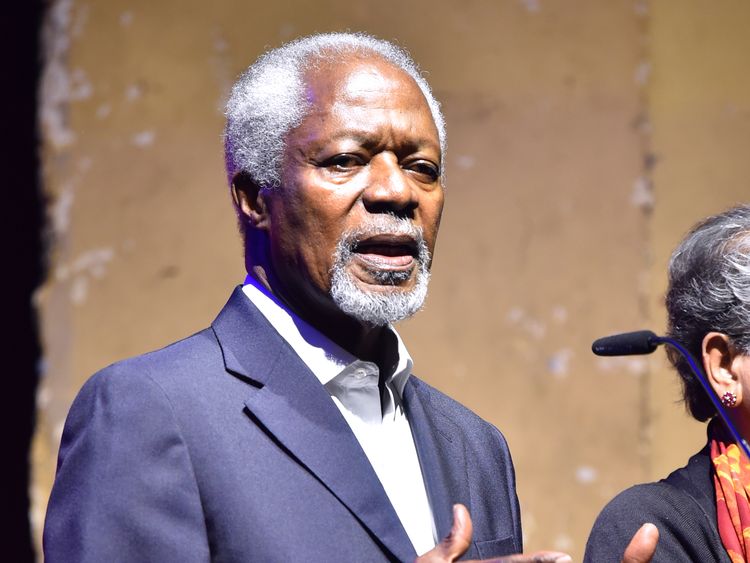The Unite Nation UN has released a statement announcing the death of 80-year old Former UN Secretary-General Kofi Annan.
Mr Annan, who was the first black African to become UN secretary-general, died early Saturday in Switzerland 18th August after a short illness, his
In a tweet, the UN Migration body said: "Today we mourn the loss of a great man, a leader, and a visionary."
It went on: "A life well lived. A life worth celebrating."
Speaking moments after the announcement, UN special envoy Peter Thompson told Sky News: "He was one of the great diplomats of our time."
Remembering Mr Annan's Nobel prize, Mr Thompson said: "He was one of our greats."
And he added: "As a Ghanaian - a son of Africa - it is a wonderful thing to see in one of the top world positions... he carried on the legacy of Nelson Mandela... and he definitely has a place in history in that regard."
The Kofi Annan Foundation said in a statement: "It is with immense sadness that the Annan family and the Kofi Annan Foundation announce that Kofi Annan, former Secretary General for the United Nations and Nobel Peace Laureate, passed away peacefully on Saturday 18th August after a short illness.
"His wife Nane and their children Ama, Kojo and Nina were by his side during his last days.
"Kofi Annan was a global statesman and a deeply committed internationalist who fought throughout his life for a fairer and more peaceful world.
"During his distinguished career and leadership of the United Nations he was an ardent champion of peace sustainable development, human rights and the rule of law."
Mr Annan, who died in a hospital in Switzerland, spent almost his entire career as an administrator in the UN and served two terms as secretary-general from January 1997 to December 2006. He was awarded the Nobel Peace Prize in 2001.
Before becoming secretary-general, Mr Annan served as UN peacekeeping chief and as special envoy to the former Yugoslavia, where he oversaw a transition in Bosnia from UN protective forces to NATO-led troops.
The UN peacekeeping operation faced two of its greatest failures during his tenure - the Rwanda genocide in 1994, and the massacre in the Bosnian town of Srebrenica in July 1995.
He presided over the UN during some of its most turbulent times, including the Iraq War when he spoke out against the George W Bush administration after the US invaded Iraq without the approval of the UN security council in 2003.
In his final speech as secretary-general in 2006 he accused the US of committing human rights abuses in its so-called war on terror.



Comments